Formerly Unasked yet Common Questions
- Platform
- Quick! Elevator Pitch!
- What can I do on BobaBoard?
- What do you Mean by "Complementing Existing Social Spaces"?
- Who is the Ideal User?
- This Sounds Really Cool, but I like my Online Identity!
- Is BobaBoard a [Insert Social Network] Clone?
- Will there be Complex Content Filters and All That Jazz?
- When will the Platform Launch?
- Business Model
- Technology
- Will there be a Mobile App? How will you deal with App Store(s)?
- Why and how is BobaBoard Embracing Open Source?
- What Type of Open Source license will BobaBoard be Released Under? What type of Functionality will it Cover?
- You talk about decentralization, will the platform use ActivityPub?
- Where will BobaBoard be Hosted?
- Community Guidelines
- Miscellaneous
- What's your Creative Philosophy regarding Fandom Spaces?
- Are You Looking for Volunteers/Collaborators?
- Do You Have Any Relationship to Fanexus?
- Do You Have Any Relationship to the OTW?
- How much time did it take you to come up with all these memes?
- Are you a Horrible Person?
- I have Questions! I have Objections! I must Know More!
Platform
Q Quick! Elevator Pitch!
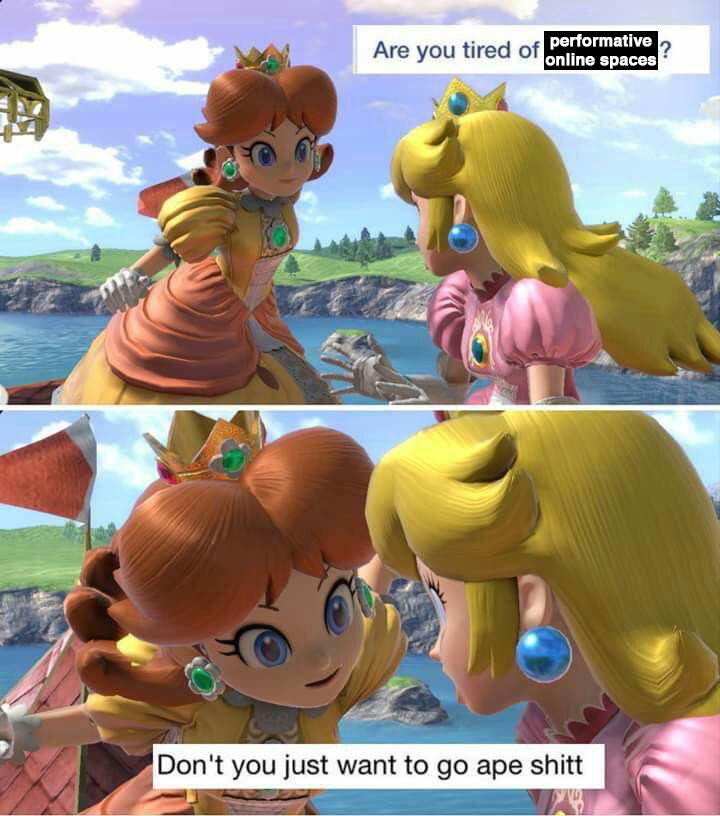
For selected definitions of "ape shitt". BobaBoard is an upcoming online community built around the concept of anonymity-first. Rather than having immediate access to members' identities and personal spaces, users will appear to each other (and the larger public) as randomized identifiers. As trust is established and connections are made (or imported), people will have the option to reveal more and more details about their identity to others.
Unlike modern social networks that encourage the accruing of "followers" and the creation of a personal brand, BobaBoard centers smaller communities and the establishment of fewer yet more high-quality personal connections within them. Additionally, BobaBoard's goal is to complement rather than substitute other online social spaces.
In the longer term, BobaBoard's development also aims to surface reusable open-source tools for the creation of other independent fandom-centered communities.
Q What can I do on BobaBoard?
Above everything, I'm creating BobaBoard as a safe space to have light-hearted fun with—as development progresses—increasingly larger groups of people in a very specific target audience (see: Who is the Ideal User?). If things go well, I hope to work towards a wider-reaching platform that gives anyone the ability to build similar spaces.
Initially, BobaBoard communities will be geared towards the creation of kink-memes/AUs, "shitposts", and longer-form, thoughtful discussions. Soon, I'd like to extend the functionality to allow the collaborative collection and remixing of content to and from other online spaces.
I'll reveal more details about BobaBoard's design and future vision in due time. Until then my question to you is: what would you want to do on BobaBoard?
Q What do you Mean by "Complementing Existing Social Spaces"?
Fandom platforms cannot give people who make content for a living the reach Tumblr/Twitter/etc. can. Instead, I'd like to create a culture that by design nurtures and enriches smaller social groups, but also encourages people to share their love on the spaces where there is, at least in the short term, a larger public.
BobaBoard isn't trying to snag you away from mainstream platforms. Your favorite creator or bigshot artist might never join us. Hopefully, the President of the United States will never tweet, toot, or whatever we're going to call it here. That's fine.

The code, as you very well know, is "I like your shoelaces." While mainstream social networks might continue to be and serve the public plaza, BobaBoard aims to grow as the fandom underbelly of the online world. Swing by at the end of a long day to eat a dead dove: we make them nice and crispy.
Q Who is the Ideal User?
While everyone over 18 is welcome, BobaBoard's target audience skews towards a very specific set of people: queer, socially-conscious, and some level of
edgychaotic good. Them, and those who love being around them.Within this group, another important target is people who, without much time to dedicate to fandom, find building online personas to be a barrier to both their enjoyment and their ability to step in and out of the space. Professionals whose fandom activity might be incompatible with their larger identity will also benefit from the balance between untraceability and connections that anonymity-first offers.
Especially at first, you're a great candidate if the idea of helping shape something that's born to be unusual and different excites you, and you can put up with the lack of a few knobs and switches.
As the platform grows, the target audience will naturally broaden. Follow development on other social networks (or subscribe to the newsletter) to keep in touch.

I swear, no more entrepreneurship comics (source). Q This Sounds Really Cool, but I like my Online Identity!
That's an understandable reaction! I also initially dismissed this idea as just a simple thought experiment. Still, the more I sat with it, the more I got excited about the different dynamics such a space could engender.
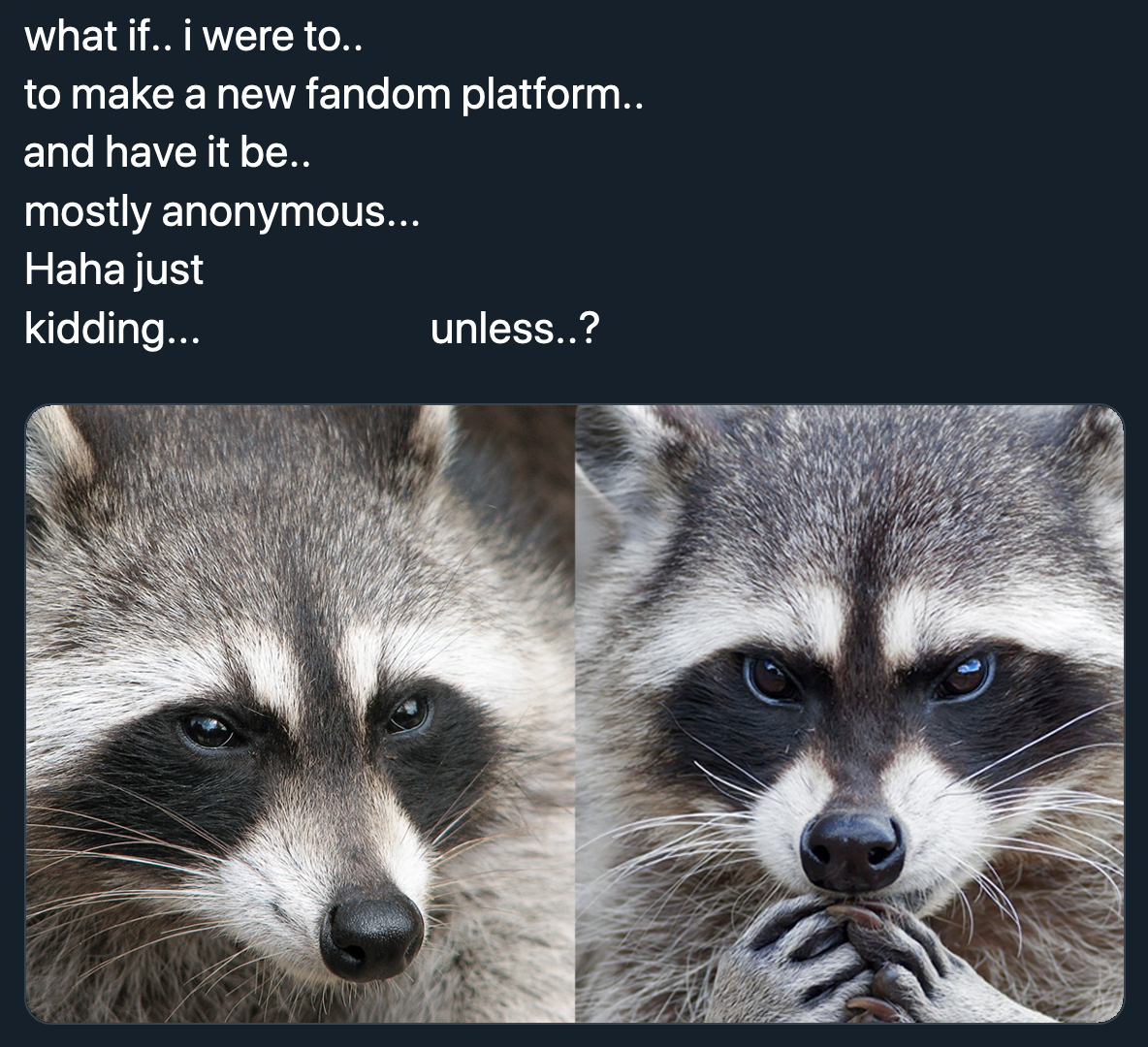
BobaBoard's ideation process. Most existing online spaces center around identity, and the rest don't often have the most stellar reputation. I believe an in-between space for fandom, balancing anonymity and connections, fills a missing niche worth exploring. I hope you'll give the concept a chance.
Trying something bold also means embracing the possibility of failure or, at least, evolution. If my takes on social spaces sound interesting, I encourage you to follow BobaBoard's development. While I intend to steer away from focusing individual users, there's no telling how the platform might change with time!
BobaBoard isn't an anything clone. Even beyond the concept of anonymity-first, I strive to rethink our assumptions on the shape of online fandom spaces.
Inspiration for the platform will come from many different sources: my Peak Fandom Fun was on Tumblr; I often come back to Amino Apps and Discord Servers as tools for the creation of smaller, "independent" hubs of fandom activity; Reddit and Quora offer insights on less-identity-centered spaces of discussion; And (I swear I'm not making this up) I've even considered lifting features from LinkedIn.
There are many ways BobaBoard could evolve as it grows, yet it's important to not be prescriptive when it comes to product development. Building a platform is, in a way, like raising a child: you can try to steer them in a certain direction, but it's important to leave them space to breathe and find their own path.
Q Will there be Complex Content Filters and All That Jazz?
If you've been anywhere online in the past five years, you know fandom has been claimoring for better filtering of content. I know you want it, I understand why you need it, and I will make sure you have it.

Getting asked about better content filtering nowadays. That said, I believe the value proposition of online fandom spaces should go beyond content filters, and that thoughtful consideration needs to be applied when designing the related user experience. While filtering is indeed important, it's neither the panacea it's sometimes hailed as nor without pitfalls.
With BobaBoard, I aim to take a different approach. While there will be some functional filtering from the get-go (and I plan to add additional features as the space evolves), the main focus is on another important question: how do we make spending time on the platform fun as well as safe?

"actually, strict tagging rules pose a series of ethical questions and are fundamentally ableist. in this essay, i will" Q When will the Platform Launch?
How many missing features, chaos, and product (r)evolutions are you willing to put up with?
What you look for in a platform and the type of influence you seek both determine the right moment for you to join: while earlier on product direction and features might still be a work in progress, you'll have a bigger impact on the final shape of the space.

In short, the less you like adventures, the longer you should wait to join. Development will be underway soon, but there are open questions that make it hard to give a precise estimate. The goal is to release "something" as soon as possible. The best way to keep up to date is to subscribe to the newsletter (or follow other social accounts) for updates.
You should also mark the following dates on your calendar: April 20 and June 9. I haven't decided what's going to happen yet, but something will. Because a terrible sense of terminally-online humor is what BobaBoard is all about!
Business Model
Q Is BobaBoard a For-Profit Platform?
Nope!
I'm creating BobaBoard because online social spaces are fundamentally broken, and I believe large, profit-first corporations are ill-fitted to solve their problems, especially when it comes to fandom.
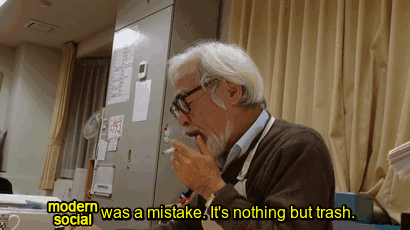
A quote as real as the one in the original meme. Above all, BobaBoard is an experiment in creating cozier, independent fandom spaces, and a stepping stone in understanding what makes them thrive. BobaBoard's success is not tied to its balance sheet, but to the happiness of its target audience.
Listen, if the goal was to get rich, I'd spend my energy climbing the corporate ladder of a cushy Silicon Valley job. It's more lucrative than building principled online spaces, and a smaller headache all around. I'm approaching BobaBoard with the full awareness that profitable fandom spaces are a crapshoot, and designing around the resulting contingencies.
Q What is BobaBoard's Business Model?
While I believe in paying people for their work, and hope to get to the point where BobaBoard is self-sustaining, I'm fully aware of the historical difficulties in creating profitable fandom spaces.
Right now, BobaBoard is fully self-funded. I'm investing a non-trivial amount of my own savings and time into the project with no strings attached.
Of course, donations and volunteering will be an option in due time.

Ah, donations. The incredibly-hard-to-scale business model. From the beginning, the plan is to strategize on lowering costs and removing single points of failure: decentralization and open-source software, while at times a double-edged sword, are a step in this direction. Being a professional Software Engineer with experience in large scale product architecture also helps.
The type of funding BobaBoard will need in the future depends on its own success, and the longer-term vision hinges on so much more. Until these are better defined, any talk of business models is little more than bamboozling.
While deferring the question is asking for a leap of faith, I believe being explicit about the difficult road to profitability is a more honest strategy than relying on vague promises around hard-to-develop "freemium" models. Truth is, I've been putting a lot of hard work into learning how to build and scale successful products, and I hope to put my knowledge to good use in due time.
Given the plethora of strategies that can be tried, let me focus now on what won't be: selling user's data; deals with people/corporations that require creative control, impose growth targets, ask for equity, or otherwise threaten the principles behind this project; anything involving selling fandom's soul to Disney; Ponzi schemes; using babies to make the philosopher's stone; large Ad Networks; trapping users in a Death Game for the paid entertainment of the masses; marrying Elon Musk.

Well, jeez, now I have to rethink the whole thing. Q How do you Define Success?
If users in the target audience are having fun and feel safe doing so, then the community is successful. Everything else, besides originating at least one new knowyourmeme entry, is a stretch goal.
In the short-medium term, I plan to explore qualitative rather than quantitative metrics to track user happiness, especially across different backgrounds. I'm purposely steering away from measurements like DAUs, ARPU, and the rest. While I aim to encourage BobaBoard's growth and will track and share that data, I believe focusing on building communities that effectively target smaller groups of like-minded individuals is one of the keys to solving the problems of modern online spaces.
my good new plan is to aquire a storefront, name it "please dont come in here" and jack off inside of it, alone, until i run out of money
— wint (@dril) February 16, 2015A clear-cut example of a successful fandom space. Q What would Cause BobaBoard to Fail? What Happens Then?
The simple answer is: no one likes it, we all go home, no harm done!
Beyond this, creating and maintaining an online platform is a lot of work, and can be an emotional rollercoaster. While I'm a stubborn person who doesn't give up easily, the moment may come when working on BobaBoard is just not "fun" anymore.

It's hard to build anything fun without having fun yourself. The choice to make BobaBoard open-source comes from the desire of never wanting to see fandom platforms be subjected to the whims of a single individual or corporation again. My hope is that, if beloved by its users, BobaBoard will be able to keep existing and grow beyond me.
Even on the internet, nothing is—nor should be—forever! When the time comes, if I haven't before, I promise to spend the necessary effort to allow users to export their data and maintain their connections beyond the platform. I also promise to work with organizations like archive.org to make sure as much internet history as possible is preserved.
Technology
Q Will there be a Mobile App? How will you deal with App Store(s)?
BobaBoard will be designed as a mobile-first experience and developed as a Progressive Web App.

They harden in response to DOM Event objects. In layman terms, Progressive Web Apps are websites you can install just like apps. They don't have to go through App Stores, and are a great way to get around their limitations.
Note that PWAs are a developing technology and don't offer all the same bells and whistles as native apps, especially on iOS. Still, they're improving by the day and even Apple (notoriously stubborn and capricious about open standards) is showing some sign of getting on board.
While relying on PWAs might require some creative workarounds in the short term, they're an excellent medium-term strategy for mobile support and offer clear advantages over developing separate native apps. As time progresses, I'll keep an eye on the development of the technology and re-evaluate if needed.
Q Why and how is BobaBoard Embracing Open Source?
Transformative fandom is a work of collaborative love. Time and time again, fans have come together to craft worlds reaching far beyond the closed borders of the source material. In this sense, Open Source is central to the spirit of fandom, and fandom needs to embrace it as much as possible.
From a larger point of view, enabling people to create their own social communities and develop extensions that target their different needs is fundamental to a healthy internet ecosystem and instrumental to the thriving of online social spaces. In this sense, Open Source's ability to expand BobaBoard's reach beyond the boundaries of its audience is key to its success and core to its principles.
In the medium term, BobaBoard aims to embrace Open Source in two ways:
- By developing and releasing core deliverables under one or more Open Source licenses.
- By working towards Open Source community and moderation guidelines that can be commented on, reused, and standardized across fandom platforms and communities.
Q What Type of Open Source license will BobaBoard be Released Under? What type of Functionality will it Cover?
I plan to release as many core features and parts of the platform as possible through a (a?)GPLv3 license. An in-depth breakdown of the functionality covered and the final decision on the license (or licenses) are currently pending further research and legal counsel.
While I strongly believe in Open Source software and fandom's need to embrace it, the decisions around when, what, and how to Open Source are not ones I want to take lightly. Each of them could impact the sustainability and growth of the effort in the long term and needs to be given the careful consideration it deserves.
Philosophically, here are some of the conundrums I'm working to untangle:
- Open Source Software can be harder to monetize and complicates the development of premium features or extended products, which might hinder long-term sustainability.
- A too-open license exacerbates the problems of external, for-profit endeavors leeching off the project without giving back to its development, stifling its growth. On the other hand, a too-restrictive one makes collaboration harder and complicates the onboarding of volunteers.
- As product direction is still being established, a too wide-reaching Open Source license might introduce dynamics that hinder development. Conversely, it might instead be key to its success. This is currently hard for me to gauge and will require a deeper analysis of historical case studies.
I believe there are models (e.g. Open Core, Multi-licensing) that can satisfactorily balance out these issues with BobaBoard's goals and philosophy, and encourage people with suggestions and experience to reach out. Opening up collaboration is a top priority, and figuring out the right Open Source strategy is key to it.

If this is how you feel, I totally understand. I'm sorry. I won't do it again. Q You talk about decentralization, will the platform use ActivityPub?
That's the plan (at some point)!
Enabling federation before having established a clear platform direction would, in my opinion, unnecessarily constrain technical, product and community development. Still, BobaBoard is meant to be extensible by design and I intend to enable federation as soon as possible.
Q Where will BobaBoard be Hosted?
Initially, BobaBoard will be hosted on Google Cloud. With time, you'll be able to host BobaBoard communities anywhere.
Making it easy to move the content in case we get kicked out of a space is part of the goals. While I don't foresee any short-term problem, I'll make sure this happens quickly enough.
(Yes, I know. Own our own servers and everything. Once the time is right, my friends.)
Community Guidelines
Q Wait, THIS Section has a Single Question?
Yes. Bear with me, kiddos, 'cause this won't work any other way.
I've thought long and hard about community guidelines. I've read books on community management, discussed it with various experts at different levels (from large-scale networks to smaller online communities) and, of course, merrily participated in fandom's favorite pasttime concerning the subject—i.e. discoursed to hell and back.
While I've acquired some expertise and intuition on how moderation might scale, the truth is that this is a really, really, really hard problem.
I don't believe there's a simple solution to the community-guidelines problem that will keep working without adjustments or drama as a platform goes from zero to however many users it expects to reach. Moderation grows exponentially harder as people join, and must evolve with the everchanging sentiment of the internet, sociopolitical landscape, and as groups of malicious actors refine their harassment techniques and play the refs like there's no tomorrow.

When I started googling mathematical equations for the sixth community-guidelines FUCQ, I realized I needed a better strategy. Sure, we might not run into any problem when we're five hundred misfits who all love each other, but what happens if BobaBoard is successful? What happens if it outgrows the queer niche of transformative fandom? What happens if there's an organized attempt to stress-test our policies, hoping to sow chaos, sink the project, and pit us against each other?
Truth is, I don't want to deal with the internet's bullshit. I want to deal with it even less in an antagonistic environment where I scramble to keep up while navigating around landmines, and where every slip-up is seen as a betrayal of everything I've promised. Policy needs to come from culture, not the other way around. This is why I'm building BobaBoard starting from a single, specific community rather than the whole web: I know there's going to be a crisis and I need to know that, when it happens, users will work with me to fix it and decide how to move forward.
More broadly, I don't believe community guidelines for online fandom platforms should be developed top-down, where a single entity is responsible for establishing what everyone can and cannot do. People should have the ability to create a community that best upholds their values, and prospective users must be able to quickly determine whether it fits theirs. There also need to be tools to keep moderators accountable, and to ensure people are not isolated by targeted smear campaigns or lose years of content and connections without appeal.
This isn't an overnight thing. Building such a system will need trust and judgement from all sides, and require a shift in how the internet content creation pipeline works at various levels. This is a social, economical, political, infrastructural, and technical problem whose shape can evolve unpredictably.
So here's what's going to happen: I will release principles to inform content moderation in the short term, open them up for comment, and, as the platform scales, work to uphold and refine those values. In the meantime, I'll also identify trusted advisors, able to advocate for different points of views but remain in line with the overall culture.
While content allowed will be maximized to the extent of the law, free speech can easily become a smokescreen for hate, and alienate the very same people I'm building BobaBoard for. When enforcing rules becomes a risk, ill-intentioned actors can use our love of freedom against ourselves. I need to be able to go to sleep at night knowing no one ended up in the hospital because of my platform, and that I won't end up accidentally destroying democracy.
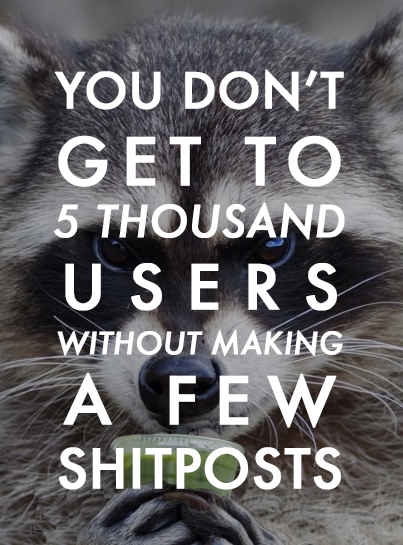
Ironically, BobaBoard started with, "hey, if I have to destroy democracy, I'd rather do it building 4chan than Facebook." "But AO3—," you say. Yes, I know. AO3. AO3 is an archive, not a social network, and thus a much, much, much easier problem. If I were to tell you "I'm going to do what AO3 does, it's going to be fine", I'd be lying. And I don't want to.
I understand you're suspicious. I understand you're tired. I am too. Take your time to evaluate what I'm doing. Wait as long as you need to and see if it works. Don't allow your heart to be broken by another social platform that happens and fizzles, or—worse—grows and abandons you. In the meantime, I'll work to give you meaningful tools that ensure your data and connections survive me and any misguided decisions I might make.
Miscellaneous
Q What's your Creative Philosophy regarding Fandom Spaces?
thinking a lot abt success of Baby Yoda & Gritty versus the manufactured unpleasantness of things like Baby Nut and the lesson is, I think, that of the lead casket:
— Anthony Oliveira (@meakoopa) February 3, 2020
you cannot fake chaos; you must risk ugliness; give and hazard allAuthenticity is the best way to build something that truly, deeply resonates with fandom. As they say, if you can fake it, you're set. Unfortunately, I have a really hard time faking shit.
Q Are You Looking for Volunteers/Collaborators?
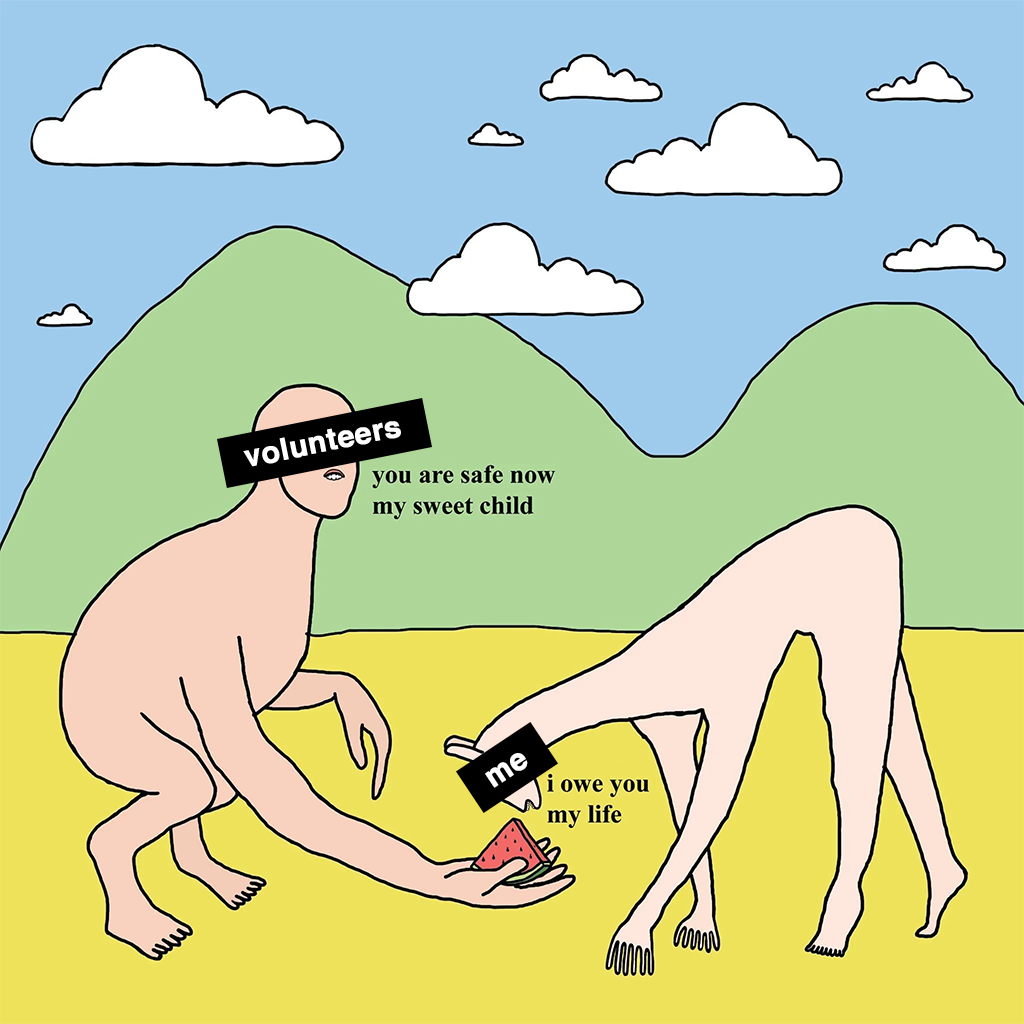
Please. While I've developed a refined ability to bang at people's doors begging for technical, legal, business, and philosophical insights, I'd love official collaborators!
Right now, I'm looking for people who can take ownership of "pieces of the problem" and come back with concrete solutions. Formal education or qualifications aren't required, but you should have some large-project experience or well-oiled skills.
If you want to offer expertise or can speak authoritatively about any of the areas this project touches, please get in touch and say hi. Even though there is such a thing as too many cooks too early, I'd love to have people I can turn to for questions and support.
If you're not an expert on anything but are itching to help when the time comes, may I suggest taking a JavaScript/React class? I swear it's fun. You can do it. Yes, you. Take it slow. Focus. You got it. It's not black magic.
I've heard good things about the Intro to JavaScript Drawing class at Khan Academy!
Q Do You Have Any Relationship to Fanexus?
While I know the Fanexus team and have discussed their vision for fandom spaces, this is an independent project.
Q Do You Have Any Relationship to the OTW?
Not officially.
I've chatted with various people involved with the OTW, and plan to do so more and more as the project evolves. It's important to understand the roadblocks they faced, and learn from the experience they accrued throughout the years.
While I'm definitely interested in what the "OTW version" of online social fandom spaces could look like, the difficulty of such an endeavor is a completely different order of magnitude than AO3 (and, alas, we're also in very different times).
When the BobaBoard project has proven itself, this might become more concrete conversation.
Q How much time did it take you to come up with all these memes?
None. This is just how I naturally speak.
Q Are you a Horrible Person?
I've purposely built this website to showcase my values and beliefs in what I think is an authentic and truthful fashion. If, beyond reasonable suspicions and personal preferences, anything here makes you uncomfortable, then, according to your belief system, the answer will most likely be yes. Sorry.
I hope that, with time, whatever I build will benefit you too. Unfortunately, I can't change who I am, and it's my firm belief that this project won't succeed unless I embrace it with my whole self, without compromising.
While I sometimes lack filters, have trouble with social conventions, and can be headstrong in my convictions (no matter how unconventional), I see myself as a person who tends towards goodness and that—albeit not always immediately—listens and carefully considers feedback. All I can promise while preserving my sense of integrity is that I'll keep being this person.
Q I have Questions! I have Objections! I must Know More!
Yay! Feel free to get in touch with me. Though it might not immediately change my mind or plans, if you approach me in good faith and respect that my top-most priority is serving the audience I care about, I'll gladly listen to and consider your feedback.
This website is many things: an ideological manifesto, an announcement of intent, and—above all—the beginning of a dialogue. While everyone should make their points with conviction, much of what you read here is up for debate. If you believe I'm being obtuse, it's better for me to learn it as soon as possible. If, instead, your concerns lie with fundamental aspects of who I am, then I assure you I've already heard it all. Take it up with the High Court of Online Discourse.
.gif)
Your honor, as clearly evidenced by the subject's browser history, she should not be allowed to run a fandom platform. I don't personally like the constant, quick access to creators that the modern web allows. While I might occasionally respond on social, I mean to give myself time to come up with thoughtful answers, and either add them to this website or my (upcoming) blog. Please remember that, like many of you, I'm mostly online to have fun. If your feedback does not require an answer, you can also use the anonymous feedback form.
If you want a quicker response, send me an email. My theory is that the higher barrier of access will increase the quality of questions and diminish trolling. If that doesn't work, I guess we'll just have to go back to the telegraph.